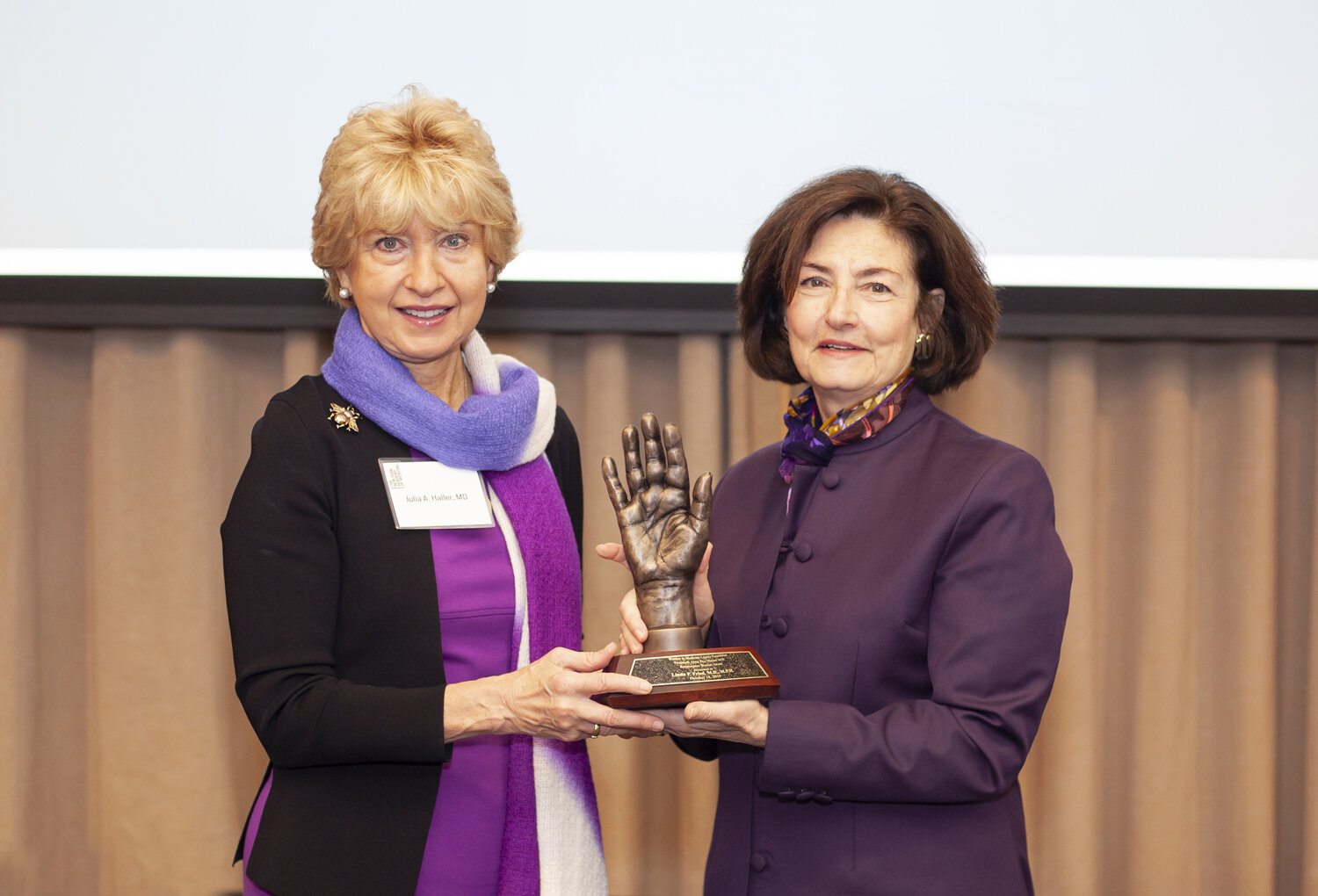Leadership Matters
Dr. Linda Fried shares the milestones of her career and work in geriatrics
Bright and early on a Friday morning, a roomful of people gathered at the New York Academy of Medicine (NYAM) to celebrate the achievements and contributions of Linda Fried, MD, MPH, the 2019 Alma Dea Morani awardee.
The event marked two important milestones: It was the 20th time this prestigious award had been presented, and it kicked off a new partnership between the Women in Medicine Legacy Foundation and NYAM.
“This partnership is such an exciting development for our organization,” shared Julia A. Haller, MD, president of the Foundation. “We are thrilled to be working with NYAM.”
Judith A. Salerno, MD, MS, president of NYAM, shared in Julia’s enthusiasm: “We’re pleased to have another like-minded partner in the Foundation in that we both recognize and celebrate the immense contributions of women in medicine and how we work toward building equity in health.”
Dr. Salerno continued, “Here at NYAM, we’re champions for health equity. We tackle the barriers that prevent people from living a healthy life. One way we do this is by fostering an environment where expertise and compassion come together to create a brighter and healthier future for everyone. That’s exactly what’s happening here today as we recognize individual excellence as well as celebrate the historical contributions of generations of women in medicine.”
Dr. Linda Fried is dean of Public Health at Columbia University’s Mailman School of Public Health where she is also professor of epidemiology and of medicine and Senior Vice President of Columbia University Medical Center. Her accomplishments are many.
“I am very moved and honored to be recognized by this so important organization and by women leaders I so admire,” she said as she accepted the award. “I’m honored to be in the company of the women who precede me.”
During her remarks, she shared some of her story, both as a woman in medicine and as a pioneer in the science of aging.
“I had the opportunity to fall in love with medicine and then with public health and then with science and then with leadership,” Dr. Fried shared. “And I’ve been blessed by working in academia with a few men and one woman who were mentors and were also beneficent leaders. I have been able to walk into work under leaders who believed in my forward goals, gave my potential a chance, and who’ve had my back. And that makes all the difference.”
On her choosing her career path, she shared that she originally didn’t want to be a geriatrician. “And yet, it struck me that we worked really hard to create these longer lives, and before we gave up on them...we needed to ask whether there were opportunities that could identify how we could increase health span to match life expectancy.”
Since saying yes to the field, she’s had the opportunity to lead geriatric medicine at Johns Hopkins and to engage in a career of scientific inquiry. “In the many population based studies I’ve led, we’ve recruited, evaluated, worked with, and retained for years over 10,000 men and women, 65 and older, who have generously contributed their time and information to improve health opportunities for everybody else. And they remind me daily that publicly funded science for health is really a partnership with the public.”
Forging her own path made her aware of how much leadership matters. “I am constantly aware that the conditions that are required to be creative are the ability to totally focus on the work and to go as deep into one’s mind as one can go, without distraction. This requires being in an environment where one does not feel at risk and in which one’s potential is valued. Women in medicine have not often had that opportunity. And I’m grateful that I have.”
But she also recognizes that despite her efforts advancing women in medicine and the progress that’s been made, there’s still work to be done. As part of her study in 1996 with Johns Hopkins, she uncovered many stories from real women - but they aren’t told. She believes that’s a mistake.
“We need to tell them, even though they’re too painful. Otherwise we lose our history, and we lose our ability to mark progress.”
Moving forward, Dr. Fried plans to continue to advance this issue. She sees her past work as the beginning. “We experienced every day the import of leadership by, as well as for, women and know that the future of medicine and health science is the better for principled, visionary, and effective leadership.”
Dr. Fried acknowledged that there were many steps along her journey that could have been the end - from going to medical school later than usual to deciding on her specialty - had it not been for changes in policy or the right person reaching out a hand.
“Obviously, leadership matters,” she said.
“Despite all these challenges and because of the opportunities, I have learned that academic medicine and public health offer the rarest of privileges to make a difference toward a better present world and to be able to see what matters for a better future,” she said of her chosen field. “Not many people in the world have such a privilege, and I’ve learned that privilege confers responsibilities to invest in work that truly matters most.”







